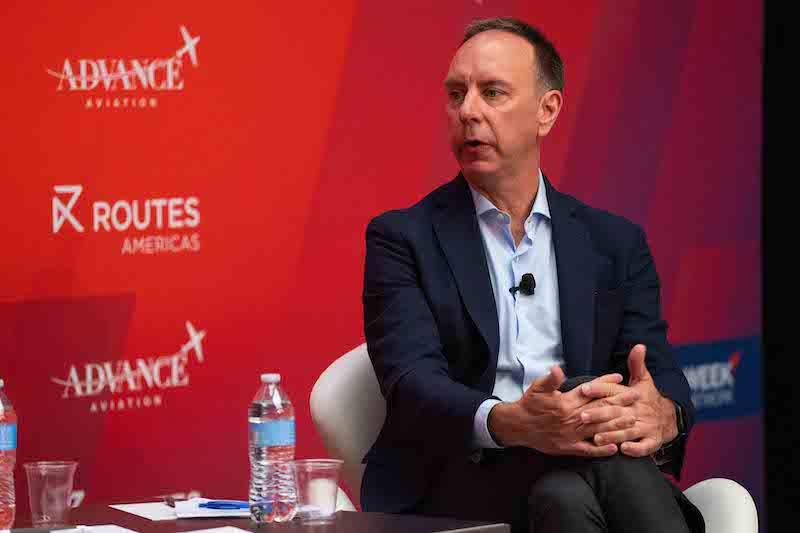
IATA's Peter Cerda speaking at Routes Americas 2023.
CHICAGO—While there is “a lot of optimism” around the air travel recovery in the Americas, governments in the region continue to hinder airlines by imposing high taxes and fees while failing to develop aviation infrastructure, said Peter Cerda, IATA's VP of the Americas.
Speaking March 21 during a fireside chat at the Routes Americas 2023 conference in Chicago, Cerda said there has been a “shift in mindset” in North and South America toward strictly regulating airlines, particularly regarding customer service options. “Politicians love to hate on us,” he said. “We’re seeing governments trying to impose themselves on [the airline] industry more than any other industry in the world.”
Cerda said regulators are hyper-focused on “looking at what’s not going right” with airlines by emphasizing “isolated incidents” that get a lot of traction on social media.
But governments too often ignore the humanitarian role airlines played in moving medical supplies and vaccines during the COVID-19 pandemic, particularly to smaller, more remote areas, Cerda argued. He added that air service facilitates economic stability for a city by bringing in tourists and valuable cargo.
Cerda noted the airline industry is “still recovering—we’re still taking aircraft out of the desert.” It is not the time to disrupt the momentum of the air transport recovery by imposing fees, taxes and regulations based not on safety or security, but on politicians’ ideas about what type of product airlines should offer customers, he said.
Let the “consumer dictate” what service is wanted, rather than governments dictating to airlines and consumers, Cerda said.
He said a flight-ticket tax could keep a passenger from traveling to a city, depriving that city of the passenger’s tourism spending. “Easy money turns out to be not so easy” when flight-ticket taxes undercut a city’s ability to bring in tourists and cargo.
“We need to be much more open minded” about how airlines are regulated, Cerda said, adding governments should be thinking: “How do we stimulate the industry so it brings much more wealth to our economies?”
Particularly frustrating, Cerda said, is governments’ lack of investment in aviation infrastructure modernization which affects customer service negatively and makes the airline industry less efficient than it could be.
He pointed in particular to the long-delayed efforts to upgrade air traffic control (ATC) in both Europe and the U.S., explaining: “A city can build as many runways as it can, but then the passenger is sitting in a terminal for 5 hr. in Chicago because of a ground delay in New York” caused by ATC.
The passenger does not understand why a delay in the U.S. northeast causes a Chicago-Los Angeles flight to be delayed or canceled and blames the airline, even though it is the FAA-managed ATC system that is the cause, Cerda said.
“We have to fix our house before we want to fix other people’s houses,” he said, adding governments wanting to improve airline customer service could do so by providing more modern, more efficient ATC.
Cerda said IATA would like to see governments interact with airlines as “a strategic partner instead of a strategic adversary.”
He added the industry itself must do a better job communicating airlines’ positive impact to counteract negative portrayals found on social media and voiced by politicians. “We’re very good at defending against attacks, but not very good at telling our story,” Cerda said. “We should take it upon ourselves to communicate how we are bringing social and economic wealth to communities."
Stay up to date with the latest news from Routes Americas 2023.
